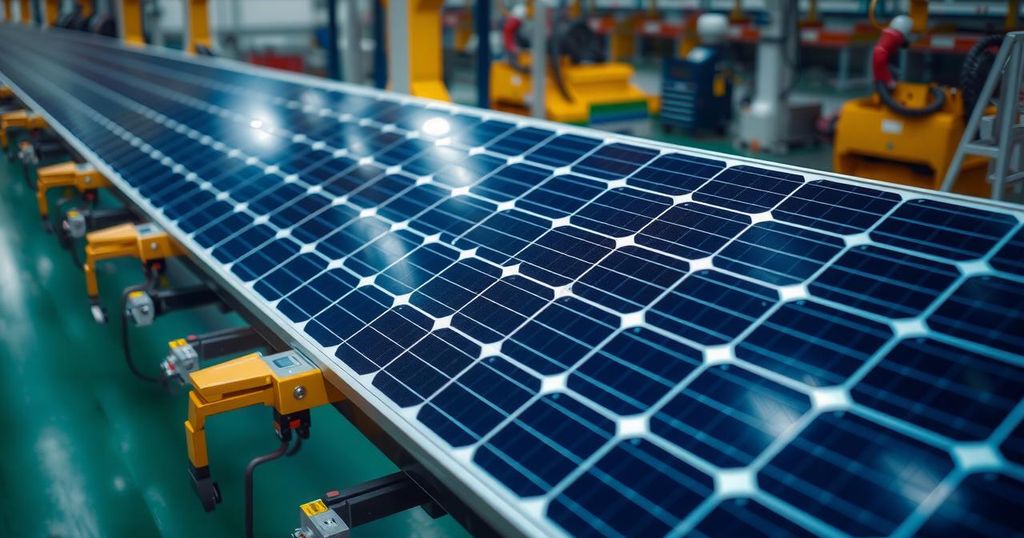Harnessing Artificial Intelligence: The Future of Solar Module Manufacturing Efficiency
Artificial Intelligence is revolutionizing solar module manufacturing by enhancing efficiency, improving product quality, and reducing costs. AI technologies optimize every stage of the manufacturing process, implement robust quality control measures, and streamline supply chains. This not only makes solar energy more affordable and accessible to consumers but also accelerates the transition to renewable energy solutions, benefiting both businesses and the environment.
As renewable energy sources gain traction in the battle against climate change, solar power stands out as an essential solution. At the heart of this shift lies Artificial Intelligence (AI), fostered as a transformative force in the manufacturing of solar modules. Through enhanced efficiency, cost reductions, and improved product quality, AI is reshaping solar panel production, bringing consumers more affordable and reliable energy options.
The solar module manufacturing process is intricate, involving numerous stages from solar cells production to panel assembly. AI plays a pivotal role by optimizing each stage through real-time monitoring and adjustments. Imagine machines that can anticipate issues before they disrupt the production flow; these AI systems effectively minimize downtime, ensuring a smoother output and consistency in quality.
Furthermore, machine learning algorithms harness vast amounts of production data, identifying patterns and inefficiencies. Through this analysis, they recommend changes that hasten production, minimize waste, and lower energy consumption during manufacturing, perfectly aligning with the sustainable aspirations of solar enterprises and reducing operational costs.
Quality control is a significant concern in solar production, given that even minor defects can severely impact solar module efficiency. AI, using cutting-edge computer vision technologies, inspects each module, detecting imperfections that may elude human scrutiny. This automation in quality assurance guarantees that only premium solar panels reach the market, ensuring reliability and durability for consumers while decreasing the need for future replacement or repair costs.
Cost reduction for consumers emerges as one of the most significant advantages of AI in solar manufacturing. Efficiency improvements lead to lower production costs, with savings passed on to customers. Enhanced resource efficiency translates to affordable solar products, widening access for homeowners and businesses alike. Moreover, AI-optimized supply chains contribute to reduced logistical costs, ensuring timely delivery and speedy installations.
Looking forward, AI’s role in solar energy does not merely stop at manufacturing; it ushers in a future brimming with potential. Innovations are expected to improve solar cells and storage solutions, further cementing AI’s cornerstone position in the renewable energy landscape. For consumers, the message is clear: AI amplifies the efficiency, reliability, and affordability of solar energy, catalyzing the transition to sustainable electricity for a cleaner planet and brighter wallets.
In conclusion, the influence of AI on solar module production is significant and multifaceted. Through streamlining processes, ensuring top-tier quality, and reducing expenses, AI enhances solar energy’s accessibility and viability. As this technology evolves, consumers can look forward to solar solutions that are not only planet-friendly but also economical, paving the way to a sustainable energy future.
In recent years, the focus on renewable energy has become a global priority, driven by the urgent need to combat climate change. Solar energy, recognized for its potential to deliver clean power, has seen a surge in innovations aimed at optimizing its production and efficiency. Among these innovations, Artificial Intelligence (AI) has emerged as a revolutionary force, particularly in manufacturing methods for solar modules. This technology offers the promise of increased efficiency, cost-effectiveness, and enhanced quality in solar panel production, ultimately benefiting consumers and the environment alike.
The advancements in Artificial Intelligence are revitalizing the solar module manufacturing landscape by elevating efficiency, quality, and cost-effectiveness. As manufacturers harness the power of AI, consumers are poised to benefit from more reliable, affordable, and accessible solar energy solutions. With continuous technological evolution on the horizon, the future of solar power looks brighter, thanks to AI’s transformative potential in the renewable energy sector.
Original Source: timestech.in




Post Comment